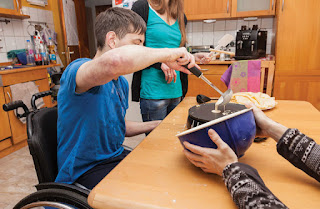How can disabled young adults achieve independent living in Massachusetts?
Transitioning to adulthood is a significant milestone for any young person. This transition can have unique challenges, especially when achieving independent living for disabled young adults.
In Massachusetts, however, various resources and support systems are in place to help disabled young adults pursue their dreams of living independently. In this comprehensive guide, we will explore Massachusetts's strategies, programs, and opportunities to achieve independent living for disabled young adults.
Understanding
the Challenges
Disabled young adults often face challenges that make independent living seem daunting. These challenges may include physical disabilities, intellectual disabilities, communication barriers, and more. Additionally, societal attitudes and stigmas can further complicate the journey toward independence. It's crucial to recognize these challenges and address them proactively.
State
Programs and Services
Massachusetts offers several programs and services to support disabled young adults in their quest for independent living. These programs encompass various aspects of life, including education, employment, healthcare, and housing. Some of the key programs include:
● Transition Planning: The Massachusetts Department of Elementary and Secondary Education (DESE) emphasizes transition planning for students with disabilities. Individualized Education Programs (IEPs) are vital in preparing students for life after high school. Transition planning includes setting post-secondary education, employment, and independent living goals.
● Vocational Rehabilitation Services: The Massachusetts Rehabilitation Commission (MRC) provides vocational rehabilitation services to help disabled individuals secure employment. These services can include job training, assistive technology, and support in finding suitable job placements. MRC works closely with clients to identify their career goals and develop a plan to achieve them.
● Housing Support: Disabled young adults often require accessible and affordable housing options. The Massachusetts Department of Housing and Community Development (DHCD) offers housing programs tailored to individuals with disabilities. This includes affordable housing developments with accessible units and rental assistance programs.
● Healthcare Assistance: Access to quality healthcare is essential. MassHealth, the state's Medicaid program, ensures eligible disabled individuals receive necessary healthcare services. MassHealth covers doctor visits, hospital stays, prescription medications, and medical equipment. It also offers Home- and Community-Based Services (HCBS) waivers that enable individuals to receive care at home or in their community.
● Transportation Services: Reliable transportation is crucial for independent living for disabled young adults. The Massachusetts Bay Transportation Authority (MBTA) offers reduced fares and paratransit services for individuals with disabilities. The Ride, MBTA's paratransit service, provides door-to-door transportation for those who cannot use regular buses or trains due to a disability.
Educational
Opportunities
Education plays a pivotal role in empowering disabled young adults. Massachusetts has various educational opportunities to support their academic and personal growth:
● Inclusive Education: Inclusive classrooms accommodating students with disabilities are increasingly common. These environments foster social integration and skill development. The Individuals with Disabilities Education Act (IDEA) ensures that students with disabilities receive a free and appropriate public education in the least restrictive environment.
● Special Education Services: Specialized education services are available to meet the unique learning needs of disabled students. These services can include speech therapy, occupational therapy, and behavioral support. Special education teachers and support staff work collaboratively with students to develop and implement Individualized Education Programs (IEPs).
● Post-Secondary Education: Massachusetts boasts numerous colleges and universities with comprehensive disability support services. These institutions facilitate higher education for disabled young adults. The Massachusetts Office on Disability (MOD) ensures that post-secondary institutions are accessible and accommodating for students with disabilities.
Employment
Opportunities
Meaningful employment is a cornerstone of independent living for disabled young adults. Massachusetts encourages inclusivity in the workplace through initiatives like Project SEARCH, which focuses on job training and placement for disabled young adults. Additionally, state and federal laws, such as the Americans with Disabilities Act (ADA), protect the rights of disabled individuals in the workforce. Employers are required to provide reasonable accommodations to employees with disabilities, ensuring equal opportunities for career advancement.
Independent
Living Skills
To achieve independent living, disabled young adults must develop various life skills. These skills encompass areas such as personal care, financial management, transportation, and household management. Various organizations and programs in Massachusetts offer training and support in developing these skills. For example, Centers for Independent Living (CILs) provide training in areas like budgeting, meal planning, and home maintenance.
Financial
Planning
Financial independence is a crucial aspect of living independently. Disabled young adults may benefit from financial planning services to help them manage their finances effectively. This includes creating budgets, understanding government benefits, and planning for future financial stability. Organizations like Massachusetts Families Organizing for Change (MFOFC) offer resources and workshops on financial planning for individuals with disabilities and their families.
Peer
Support
Peer support can be invaluable for disabled young adults navigating the path to independent living. Peer support groups and networks exist throughout Massachusetts, offering opportunities to connect with others facing similar challenges. These groups provide a platform for sharing experiences, strategies, and emotional support. Peer mentors can provide guidance based on their experiences with disability and independent living.
Conclusion
Achieving independent living as a disabled young adult in Massachusetts is attainable with the right resources and support. By accessing state programs, and educational opportunities, building strong support networks, and pursuing meaningful employment, disabled young adults can work towards their goals and live fulfilling, independent lives.
Massachusetts' commitment to inclusivity and disability rights ensures that disabled individuals have the tools and opportunities to thrive in adulthood. With determination, support, and access to essential services, disabled young adults in Massachusetts can confidently pursue their dreams of independent living.
The
Northeast Independent Living Program (NILP) is about empowering individuals
with disabilities to achieve their fullest potential and lead independent
lives. Feel free to reach out if you or someone you know could benefit from
their services and support. Contact them today to explore how NILP can
positively impact your journey to independence. Together, we can turn
aspirations into realities.



Comments
Post a Comment